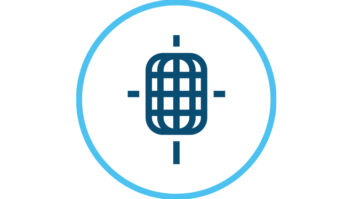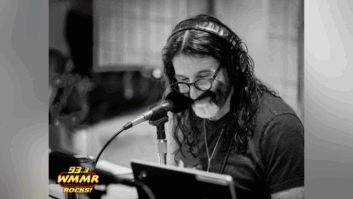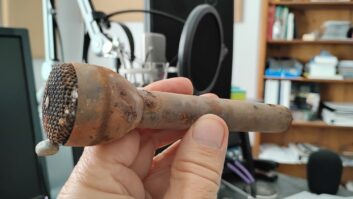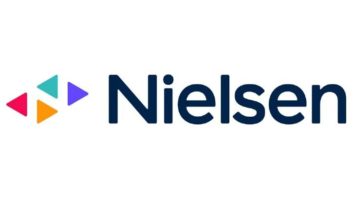
Michael Kacey
Radio vet Michael Kacey is working on a documentary about radio, its history and where it might be going. So far he’s interviewed a number of radio legends. He talked with Radio World about the project and how much more needs to be done.
Radio World: “Hearing Voices” is a documentary feature film. Tell us what it’s about and why you’re making it.
Michael Kacey: “Hearing Voices” examines the evolution of radio as a mass medium and compares it with the rapid rise of the Internet. Radio once had many voices and they have become fewer and fewer through the years. By that, I mean mass consolidation and the loss of truly local programming. Since history has a way of repeating itself, my film asks if this will happen to the Internet as well. I chose the title “Hearing Voices” because on radio we literally hear voices, and on the Internet these voices are, to me, points of view. Voices matter and that’s one of the reasons I’m making this film. The other reason is that I love radio and its history.
RW: You’ve interviewed some iconic radio folks for this. Give us some names.
Kacey: I began this project some years back, sensing that I needed to get some of these voices from radio’s past as soon as I could. In that regard I was very fortunate to sit with Art Linkletter, creator/producer/host of “House Party” and “People Are Funny;” radio’s poet laureate Norman Corwin, who wrote, directed, and produced the first four-network radio broadcast “We Hold These Truths” in 1941; Dick Van Patten, who worked in over 600 radio shows as a juvenile; and recently I added Wink Martindale and Larry King to the roster of interview subjects. It’s been incredible.
RW: Who among them really stood out as particularly notable or interesting?
Kacey: Norman Corwin comes to mind, first and foremost. He was 94 when I interviewed him. He recalled the moment of discovering radio for the first time when a friend told him about a crystal set and let him listen to Morse Code. He talked about the importance and power of the medium during the Golden Age, as well as its fall from grace when TV arrived. As a victim of the blacklist, he also shed light on those dark times. Norman Corwin covered it all.
Another standout for me was Art Linkletter. He regaled me with such entertaining stories and shared his own opinions on the medium of radio. “It’s not an educational medium. It’s not an entertainment medium. It’s a sales medium.” It was a great quote delivered by one of the best in the business.

Larry King being interviewed by Michael Kacey for “Hearing Voices.”
A word about Larry King. He was the easiest interview for me. Once I had done my preparation, that is. He loves radio so much that he continued doing his radio show long after he doubled his salary at CNN doing “Larry King Live.” He is extremely proud, and deserves to be, of the Peabody Medal he was awarded for “The Larry King Show” on the Mutual Radio Network. It meant, and still means, a lot to him. His love of the medium was honestly infectious.
RW: Is there an overarching theme or a conclusion that you’re coming to about radio, as you do this work?
Kacey:If there is any overarching theme, it’s that radio is the most powerful and influential medium that we definitely take for granted. It has moved from primetime entertainer to a service industry giving us news, traffic and weather, and has consistently been there for us when things go wrong. When there is an emergency and the power goes out, it is radio that we still turn to for information and, just as importantly, that connection with others. We are never alone thanks to radio. And when you consider amateur operators and their contributions during hurricanes and earthquakes, you really see that radio saves lives. It’s a pretty impressive medium.
RW: Your website mentions “amazing and disturbing parallels between the Internet and radio.” Such as? And why disturbing?
Kacey: Hyperbole aside, now it turns serious. When I first began this documentary, it was intended to be a love letter to the Golden Age of Radio. However, the more research I did, the more serious and important radio’s story was to me. As a medium it held, and still holds great power. It has the ability to influence society and values; it can inform and it can deceive. This is true for radio, television, and the Internet. The main issue is access. Whoever controls the access to a medium, possesses power and responsibility.
When radio began, it was hobbyists who built their own sets and communicated with one another at will. Once commercial use took hold, as it does if a medium is to survive and grow, the amateur voices were largely squeezed out, keeping the prime frequencies for commercial radio stations and networks. Their voices were supplanted by advertisers, in essence.
Now, as we look at the Internet, we see a medium that also began with hobbyists, or computer geeks, who posted on bulletin boards and chatted, gradually helping the World Wide Web take form. It is not unexpected to see the Internet supported and driven by advertising dollars. It was destined to happen. But what is disturbing to me is the feverish drive to monetize access to this medium, the most powerful “Means to Communicate” yet devised.
I speak of “Net Equality.” Forget Net Neutrality. That term is boring; it holds little real meaning to people. But what is at stake is equality — equal access to the Internet. The current FCC Open Internet Rule that went into effect on June 12, is already under assault. It prohibits website blocking, throttling speeds and paid prioritization. In short, this website loads just as quickly as CNN.com, a Time Warner Co. website. This is our voice. In radio, so many stations were bought up, corporatized, and drained of local voices. Content and decisions about the content you hear comes from relatively few sources. This is disturbing to me. If this happens to the Internet, our voices will be marginalized permanently.
Of course there are other parallels between these mediums, but none so central to our future as this one.
RW: How are you funding this project?
Kacey: I started with my retirement money and worked backwards from there. Only (mostly) kidding! Over the past few years I have saved up money in order to be able to afford a round of interviews. To get the look and quality this film needs, I have a cinematographer, production sound mixer, my producer, Dave Sanford, myself and, most times, one production assistant in order to get the job done. I have been applying for grants to finance the production, but they take time and are difficult to get because, frankly, there are many worthy projects out there. “Hearing Voices” recently acquired fiscal sponsorship through the International Documentary Association so that donations made through them are tax-deductible.
Currently, I am running a crowdfunding campaign using Indiegogo.com. I have a link to both that page and the IDA page on my website, HearingVoicesTheMovie.com. The goal is to raise enough money to resume filming interviews that will focus on radio voices of today as well as media experts who can discuss the present and future of radio and the Internet. The topic of Net Neutrality, or “Net Equality,” as I like to call it, is vital to this project.
RW: When will it be done, and what are you plans or hopes for distribution?
Kacey: The most likely path for the film is to debut at a prominent film festival before making a broadcast debut. The more prestigious, the better, of course. After that, the true value of “Hearing Voices” will be in colleges and universities and even high schools, to be used as an exciting and stimulating way to introduce the subject of radio to a new generation and give them an appreciation for this special medium.
RW: What else might people in the radio business want to know about it?
Kacey: They should know that I believe what they do matters. My aim is to be positive and largely celebratory because that’s how I view the medium. Even with the enormous changes that have occurred regarding ownership and diminished opportunities for a career in the business, radio has such a value in our lives. We sometimes lose sight of that fact. No matter the circumstances, I hope that everyone in the radio business tries to keep improving the industry and make things better; remembering that what they do matters more than they realize.
RW: In a few sentences, what is your own background and involvement in other radio projects?
Kacey: I hail from a small coal-mining town in Pennsylvania where I listened incessantly to our tiny AM radio station, WISL. After a stint in the Army I ventured into broadcasting while at Penn State, first on the campus radio station, and then two additional commercial radio stations. I lived the dream of playing music on the radio until I moved to Los Angeles to pursue an acting career. From acting to writing and directing, I found my way into filmmaking and this documentary about radio, leading back to my first love. From legendary Norman Corwin I learned how to direct radio drama re-creations and began a side career, hobby, really, of directing some remaining old time radio performers in classic radio scripts before a live audience. That has been an unexpected journey that has only deepened my appreciation for this wonderful thing we call radio.







